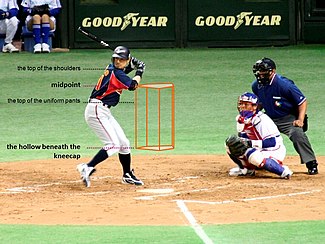
Back Strikezone Danish Strike Zone German Zona de strike Spanish Zone de prises French ストライクゾーン Japanese 스트라이크 존 Korean Slagzone Dutch Strefa strike’ów Polish Zona de strike Portuguese Strike zone SIMPLE

In baseball, the strike zone is the area of space through which a pitch must pass in order to be called a strike even if the batter does not swing. The strike zone is defined as the volume of space above home plate and between the batter's knees and the midpoint of their torso. Whether a pitch passes through the zone is decided by an umpire, who is generally positioned behind the catcher.
Strikes are desirable for the pitcher and the fielding team, as three strikes result in a strikeout of that batter. A pitch that misses the strike zone is called a ball if the batter does not swing at it. Balls are desirable for the batter and the batting team, as four balls allow the batter to take a "walk" to first base as a base on balls.